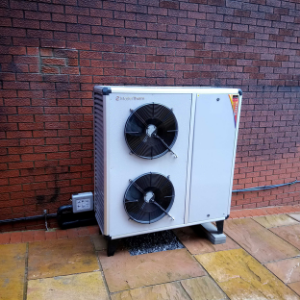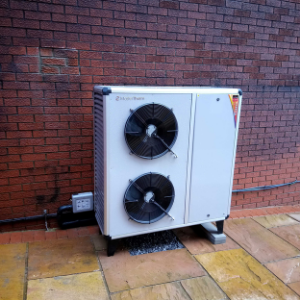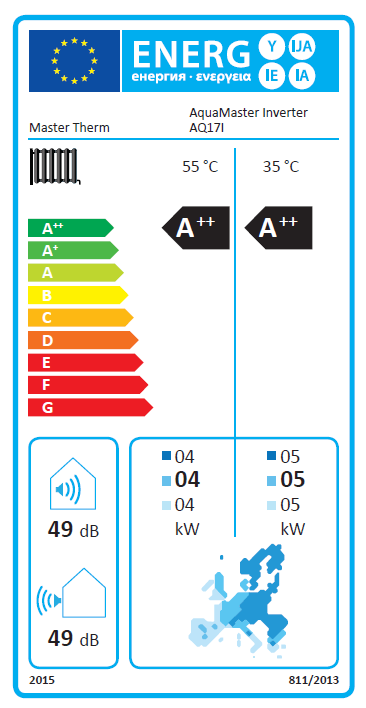Blog

Are Heat Pumps Efficient?
Posted on 03 September 2021 in Blog

If you’re considering purchasing a heat pump, you may be wondering about how the efficiency compares with other heating systems. Below we’ve answered some of the most frequently asked questions about efficiency and provided guidance for how to measure efficiency performance between heat pump models.
Introduction
Heat pumps are extremely efficient - it’s one of the main reason why homeowners and business owners choose to install one. They require electricity to operate but for every 1kW of electricity used they will produce 3-4kWh of usable heat energy, that’s an efficiency of 300-400% compared to just 90% for a new gas boiler.
Why does efficiency matter?
Having a more efficient heating system can help to save you money on your energy bills because the energy is uses goes further, so you need less of it. Because less energy is needed it can also reduce use of fossil fuels, which is particularly important whilst the electric grid is being decarbonised.
What are the most efficient heat pumps?
Water source heat pumps are the most efficient as water has excellent thermal conductivity, however water source heat pumps are not that widely installed as most properties are not situated near a viable water source.
Ground source heat pumps are the next most efficient, this is because the temperature in the ground stays at a consistent 10-12 degrees all year round. Ground source heat pumps with vertical ground collectors (boreholes) are more efficient than horizontal ground collectors (trenches) because the deeper underground the more consistent the temperature will be all year round.
Whilst they are the most popular type of heat pump, air source heat pumps are the least efficient type of heat pump. This is because they extract heat energy from the air and during winter, when the air is cooler, they need to use more energy to raise the temperature to a usable level.
Are heat pumps efficient in cold weather?
Yes, heat pumps are still more efficient in cold weather compared to other heating systems such as gas or oil boilers. You’ll find that the efficiency of a ground source heat pump will not change much across the seasons, whereas with an air source heat pump there will be a slight drop in efficiency - both will still continue to provide your expected levels of heating however.
Are heat pumps more efficient than electric heat?
Electric heat exists in a variety of formats such as electric fires, portable radiators and infrared heating panels. These options use 100% electricity to produce heat whereas a heat pump will use around 70% free heat energy from the environment and 30% electricity, which makes them more efficient in how they use energy. Whilst the other electric options will deliver heating, they are often used in a way that delivers short, high temperature blasts of heat - working to warm the building quickly in a few hours and then switching off again (the temperature then falls and the pattern is repeated). Heat pumps operate continuously at low temperatures, automatically topping up the heating to reach preferred levels when needed. This is a much more efficient way to operate as you're getting exactly the amount of heat needed for the property - no more or less, so no energy is wasted. This is particularly true of inverter heat pumps which modulate output between 30-100% depending on how much of a heat top-up is required.
How is heat pump efficiency measured?
There are 3 ratings you will see used in the heat pump industry:
COP (Co-efficient of Performance)
This measurement considers the amount of energy (electricity) used compared with how much useful heat is generated. COP measurements are specified to one specific temperature, which is why SCOP was developed - to provide a measurement which took into account the fluctuation of efficiency across the seasons and their temperature range.
SCOP (Seasonal Co-efficent of Performance)
This seasonal heating measurement represents the ratio between the total produced heat and the total electricity consumption. The higher the SCOP rating, the better the efficiency. Each heat pump will often have two SCOP ratings, one for low-temperature operation at 35°C and one for medium temperature operation at 55°C.
ErP Labels

You’ll find ErP labels on most electronic equipment from televisions and computers to fridges and washing machines. They are designed to help you easily interpret the energy performance of a product and compare two different products against one another. ErP labels for heat pumps are based on SCOP rating and the methodology for energy efficiency is defined in BS EN 14 825. Instead of printing the the SCOP rating as a number, a grading system is used to represent the rating, the grades range from A++ for the best performance and G for the worst performance.
The ErP label also displays the heat pump sound rating in decibels. The sound rating is given for the noise level you’d hear if you were standing right next to the heat pump. Below you can see the MasterTherm AQ17i has a sound rating of 49 decibels which is quieter than a household fridge.
Have a question about installing a heat pump?
 Facebook
Facebook LinkedIn
LinkedIn Twitter
Twitter













